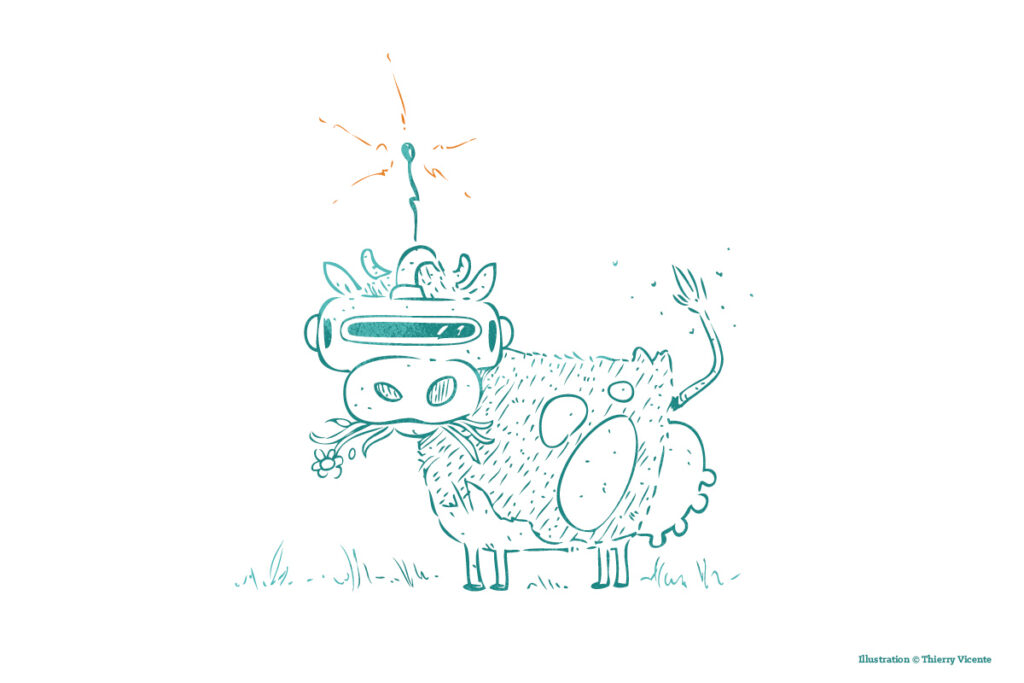[LUM#7] When digital technology takes to the countryside
Will digital technology be the salvation of agriculture? That's the bet being made by the #Digitag, a multidisciplinary research organization launched in Montpellier in 2016. The focus is on less energy-intensive production and relieving farmers of the most thankless tasks. A revolution in the making.

A host of sensors to manage water supply and fertilizer use, a battery of connected traps that release pheromones to guide pests away from crops, a wealth of shared data to inform decision-making, all centralized on a smartphone that has become the farmer's primary assistant... Welcome to the farm of the future, a concentration of technology designed to improve practices, make them more environmentally friendly, and less restrictive for farmers (Technological innovation in agriculture, in Géoeconomie, 2016).
Towards a chosen practice, not an imposed one
"The goal is twofold: to improve production and better integrate farmers into society," explains Véronique Bellon-Maurel, director of the eco-technologies department atIrstea. "Farming is a very complicated profession, and it's becoming increasingly so , with technical, regulatory, administrative, and commercial complexities. Add to that a level of uncertainty that is unmatched in any other profession and is only increasing with climate change..." It's a bleak picture, but one that digital technology could help to brighten.
"Automatic tractor guidance has changed the lives of many farmers," says the director of the #DigitAg Institute. "When you don't have to concentrate on following a line, you can think about other things..." The same goes for milking robots, which have freed up valuable time for farmers to engage in commercial activities, take care of their herds... or their family life. In short, for Véronique Bellon-Maurel, it's about enabling farmers to invest in activities that are "either more lucrative or more fulfilling, but in any case chosen rather than endured."
Ageekculteurs
Is digital technology the lifeline for a profession in crisis? The idea is not necessarily obvious, given that automation is more closely associated with the widely contested model of intensive agriculture. This is a misconception, according to the Irstea researcher, who sees it instead as an opportunity to move towards greater frugality: "Organic farmers, for example, are the ones who need to observe the most, because in this type of agriculture, interventions are rare and must be precise and anticipated." The goal is to produce better. "Limiting the use of plant protection products means saving time and tractor fuel, not to mention the benefits in terms of pollution and health for the farmer," summarizes the specialist (Putting agricultural equipment and digital technologies at the forefront of agroecology, in OCL vol. 24, 2017).
For small farmers, digital technology is also a powerful lever for breaking out of isolation. This has led to a proliferation of "ageekculteurs" (tech-savvy farmers) who maintain blogs and Twitter accounts and frequent forums and other crowdfunding platforms. At the end of the chain, digital technology is also disrupting distribution by facilitating links between producers and consumers: AMAPs, short supply chains, etc. The result is a rebalancing of the power relationship imposed by traditional distribution players.
Young shoots and big fish
As a result of this paradigm shift, agriculture is opening up to a new audience that is more tech-savvy and also more female. "It's a chance to see people coming in who don't have a background in agriculture and who have a different way of understanding it , " says Véronique Bellon-Maurel. While almost every day sees the launch of a new app for farmers, the digital revolution is not without its concerns, particularly regarding the mountain of data emerging from our countryside (Data to share, value to create in the digital economy, in Agricultural Innovations, INRA, 2018). "Data is now being collected with a spatial and temporal frequency never seen before. This represents a great opportunity to use smart data to extract models that will shed light on how crops and livestock are managed. But there is also the question of data security. What will happen if this data is captured by monopolistic players?" asks the director of #DigitAg.
Faced with the risk of agrochemical companies or other seed producers monopolizing these databases for their own profit, there is a lifeline: opening up the data, thereby promoting the emergence of a plurality of players (start-ups, cooperatives) rather than a few giants. An "open agriculture" that could one day allow everyone to find happiness in the fields once again.
Agriculture is going digital in Africa too!
Is digital technology in agriculture a high-tech luxury reserved for rich countries? Not at all, say researchers at the #DigitAg Institute, some of whom are interested in the use of new technologies for agriculture in developing countries. In Africa, the development of mobile phones is opening up a world of possibilities. Today, they give producers direct access to commodity prices, reducing their dependence on traders. Thanks to their phones, farmers can also receive recommendations from specialists and regularly updated weather forecasts. Another promising development is the use of satellite images to scan the situation in an agricultural area at a glance. This makes it possible to assess the water or input requirements of large areas on a daily basis without having to travel there.
Find UM podcasts now available on your favorite platform (Spotify, Deezer, Apple Podcasts, Amazon Music, etc.).